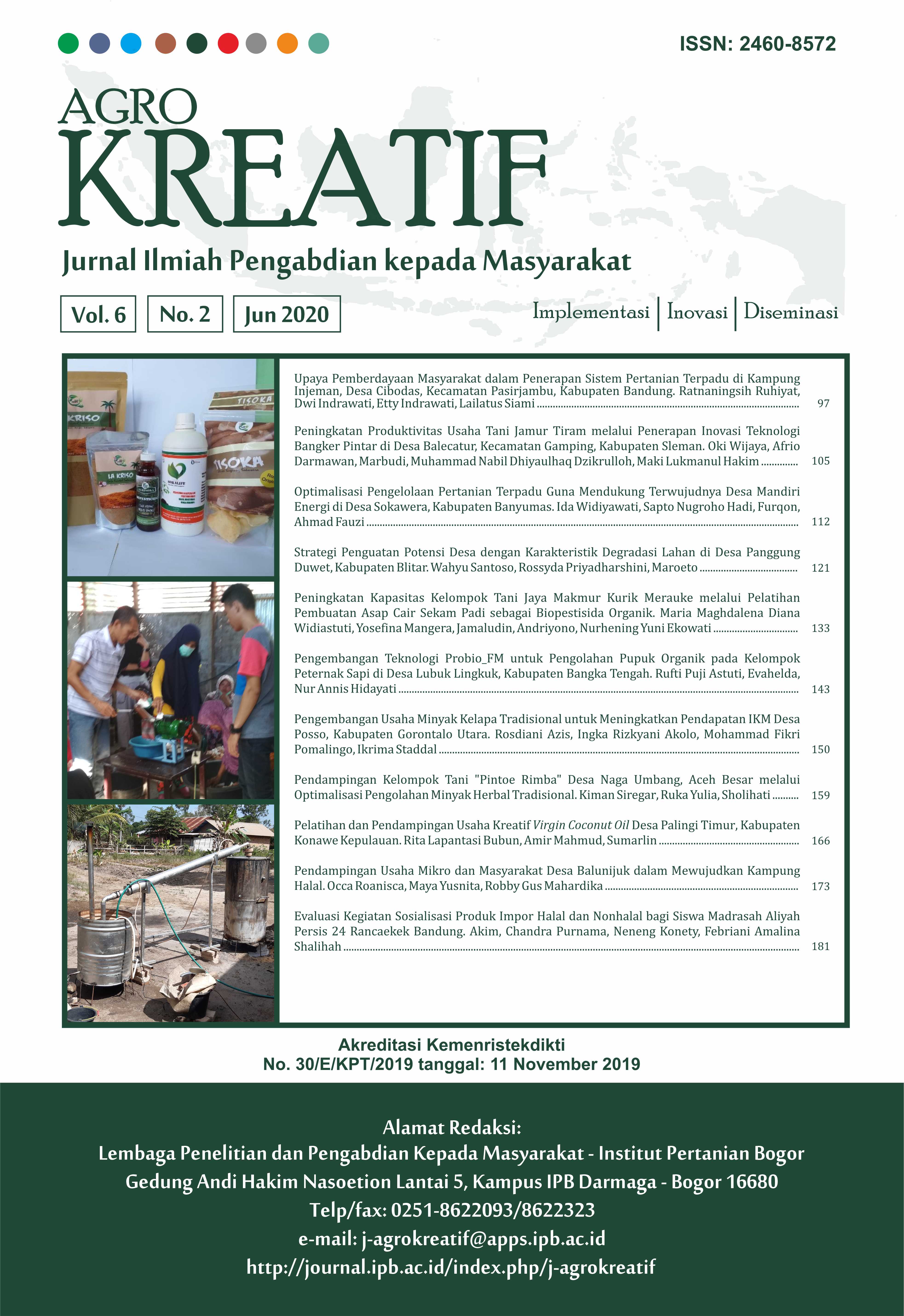Evaluasi Kegiatan Sosialisasi Produk Impor Halal dan Nonhalal bagi Siswa Madrasah Aliyah Persis 24 Rancaekek Bandung
Abstract
The existence of Indonesia as a country with the largest number of Muslim societies in the world is an allure for foreign producers, coupled with the preference of people who are relatively more interested in imported products resulting in Indonesia's domestic market being flooded with imported products. This condition is a bit dangerous for Muslim consumers when it is associated with the lack of halal awareness in Indonesian society, so that the activities of community awareness are needed, one of which is in the form of socialization activities. This article aims to evaluate the socialization activities carried out among Madrasah Aliyah (Islamic Senior High School) students in Rancaekek Bandung. The socialization activities are carried out using the seminar method in the form of lectures with questions and answers and simulation methods in the form of simulation exercises. Meanwhile, the evaluation of the socialization activities was carried out by conducting pre-test and post-test with the help of IBM SPSS version 21 to measure the effect of socialization on the knowledge of the students of Madrasah Aliyah Persis 24 Rancaekek related to the halal of imported products. From the test results obtained, it can be concluded that the socialization activities carried out succeeded in increasing the knowledge of the students of Madrasah Aliyah Persis Rancaekek regarding the importance of the halal status of imported products circulating in the community.
Downloads
References
Agrifood. 2018. Tidak Berlabel Halal, 11 Produk Makanan Impor Beredar di Pasaran. Retrieved Maret 20, 2020, from Agrifood: https://agrifood.id/tidak-berlabel-halal-11-produk-makanan-impor-beredar-di-pasaran/
Akim, Konety N, Purnama C, Adilla MH. 2018. Pemahaman Usaha Mikro, Kecil, dan Menengah (UMKM) di Jatinangor Terhadap Kewajiban Sertifikasi Halal Pada Produk Makanan. Kumawula: Jurnal Pengabdian Kepada Masyarakat, 1(1), 31-49. https://doi.org/10.24198/kumawula.v1i1.19258
Baharuddin K, Kassim NA, Nordin SK, Buyong SZ. 2015. Understanding the Halal Concept and the Importance of Information on Halal Food Business Needed by Potential Malaysian Entrepreneurs. International Journal of Academic Research in Business and Social Sciences. 5(2): 170‒180. https://doi.org/ 10.6007/IJARBSS/v5-i2/1476
Berty TT. 2019. Jokowi: Indonesia Negara Muslim Terbesar, Modal Utama Diplomasi Internasional. Retrieved Maret 20, 2020, from Liputan6: https://www. liputan6.com/global/read/3930124/jokowi-indonesia-negara-muslim-terbesar-modal-utama-diplomasi-internasional
[BPS] Biro Pusat Statistik. 2018. Statistik Tematik: Profil Generasi Milenial Indonesia. Jakarta: Kementerian Pemberdayaan Perempuan dan Perlindungan Anak.
[BPOM] Badan Pengawas Obat dan Makanan. 2017. Penarikan Produk Mi Instan Asal Korea yang Mengandung Babi. [Internet]. [Diakses pada Maret 2020]. Tersedia pada: https://www. pom.go.id/new/view/more/ pers/374/PENARIKAN-PRODUK-MI-INSTAN-ASAL-KOREA-YANG-MENGANDUNG-BABI.html
[BPOM] Badan Pengawas Obat dan Makanan. 2019. Statistik Produk yang Mendapat Persetujuan Izin Edar. [Internet]. [Diakses pada Maret 2020]. Tersedia pada: https://www.pom.go.id/new/%20
Budiman R. 2019. Factors Influencing Purchase Intention of Halal Products in Pontianak City. Indonesian Journal of Halal Research. 1(2): 46‒48. https://doi.org/10.15575/ijhar.v1i2.4440
Hakim RN. 2019. Ma'ruf Heran Indonesia jadi Importir Produk Halal Terbesar di Dunia. Retrieved Maret 20, 2020, from Kompas: https://nasional.kompas.com/read/2019/12/06/22184151/maruf-heran-indonesia-jadi-importir-produk-halal-terbesar-di-dunia
Handayani S. 2016. Waspadai Produk Impor Berlabel Halal Palsu. Retrieved Maret 20, 2020, from Republika: https://republika.co.id/berita/o3vfwa23/waspadai-produk-impor-berlabel-halal-palsu
Hosanna MA, Nugroho SA. 2018. Pelaksanaan Undang-Undang Nomor 33 Tahun 2014 Tentang Jaminan Produk Halal Terhadap Pendaftaran Sertifikat Halal Pada Produk Makanan. Jurnal Hukum Adigama. 1(1): 1‒24. https://doi.org/10.24912/adigama.v1i1.2155
International Trade Centre. 2015. From Niche to Mainstream: Halal Goes Global. Geneva (CH): International Trade Centre.
Kementerian Agama. (2020). Data Umat Berdasar Jumlah Pemeluk Agama Menurut Agama. Retrieved Maret 20, 2020, from Kementerian Agama Republik Indonesia: http://data. kemenag.go.id/agamadashboard/statistik/umat
Kementerian Pemberdayaan Perempuan dan Perlindungan Anak. 2018. Statistik Tematik: Profil Generasi Milenial Indonesia. Jakarta (ID): Kementerian Pemberdayaan Perempuan dan Perlindungan Anak.
Lada S, Tanakinjal GH, Amin H. 2009. Predicting intention to choose halal products using theory of reasoned action. International Journal of Islamic and Middle Eastern Finance and Management. 2(1): 66‒76. https://doi. org/10.1108/17538390910946276
LPPOM MUI. 2019. Data Sertifikasi Halal LPPOM MUI Periode 2011–2018. Retrieved from LPPOM MUI: http://www.halalmui.org/ mui14/index.php/main/go_to_section/59/1368/page/1
Newman D, Kramer S, Blanchard O. 2016. Marketing to Millenials. Futurum. Technology Insights for Business Leaders.
Nirwandar S. 2019. Tata Kelola Sertifikasi Halal di Asia Tengggara. (Amantjik FR & Shalihah FA Interviewers)
Nusran M, Gunawan, Razak M, Numba S, Wekke IS. 2018. Halal Awareness on the Socialization of Halal Certification. In: IOP Confrence Series: Earth and Environmental Science. page: 1‒7. https://doi.org/10.1088/1755-1315/175/1/012217
Ramadhan B. 2016. Petugas Temukan Makanan Impor tak Berlabel Halal Saat Sidak. Retrieved Maret 20, 2020, from Republika : https:// republika.co.id/berita/oijcap330/petugas-temukan-makanan-impor-tak-berlabel-halal-saat-sidak
Ratanamaneichat C, Rakkarn S. 2013. Quality Assurance Development of Halal Food Products for Export to Indonesia. Procedia - Social and Behavioral Sciences. 88: 134‒141. https://doi.org/10.1016/j.sbspro.2013.08.488
Revin I, Suradi, Islamiyati. 2017. Perlindungan Hukum Bagi Konsumen Terhadap Adanya Pemalsuan Labelisasi Halal Pada Produk Pangan Impor. Diponegoro Law Journal. 6(2): 1‒12.
Robin WA. 2004. Guidelines for the preparation of Halal food and goods for the muslim consumers. Putrajaya, Malaysia (MY): AmalMerge.
Salehudin I. 2010. Halal Literacy: A Concept Exploration and Measurement Validation. ASEAN Marketing Journal. 2(1): 1‒12. https://doi.org/10.21002/amj.v2i1.1987
Aprilia EU. 2011. Impor Makanan, Obat dan Kosmetik asal Cina Hanya 3 Persen. [Internet]. [Diakses pada: 6 Oktober 2019]. Tersedia pada: https://bisnis.tempo.co/read/328442/ impor-makanan-obat-dan-kosmetik-asal-cina-hanya-3-persen
Yasid, Farhan F, Andriansyah Y. 2016. Factors Affecting Muslim Students Awareness of Halal Products in Yogyakarta, Indonesia. International Review of Management and Marketing, 6(S4), 27‒31
This work is licensed under a Creative Commons Attribution-NonCommercial 4.0 International License.



















